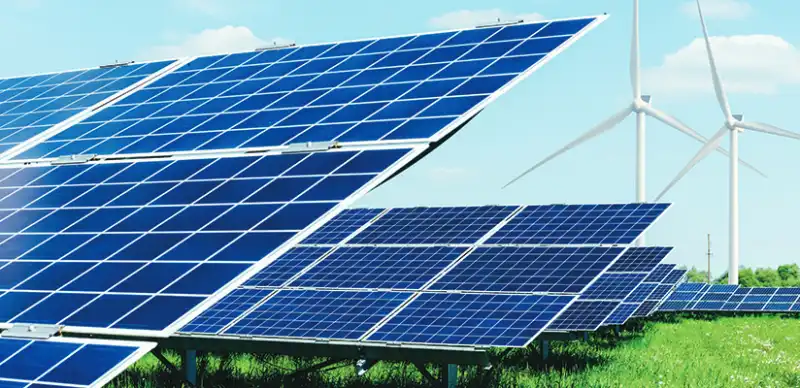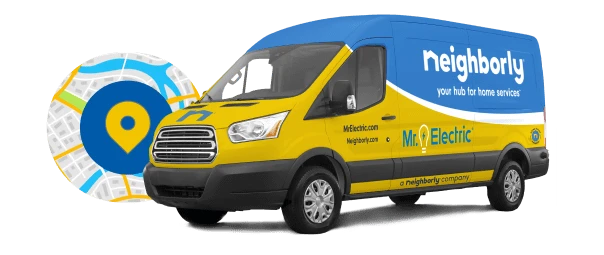Publishing date 08/27/25

Mr. Electric explains key types of electrical sources and their uses.
|
Electricity powers nearly every aspect of modern life, from your morning coffee to the car you drive. While most people flip on a light switch without thinking twice, few understand where electricity actually comes from.
This blog breaks down the different types of electricity, how power is generated, and the primary sources of electricity that keep our homes, businesses, and communities running. Whether you’re a homeowner curious about your utility bill or a business leader exploring renewable options, understanding electrical energy sources can help you make more informed decisions about usage, efficiency, and a sustainable future.
Primary Sources of Electricity
The types of electricity we use are categorized by how they’re generated, but the method is typically very similar. Each source of electricity harnesses a different medium to produce mechanical energy, which is then converted into electrical energy by a generator. Here are the most common electrical energy sources:
Fossil fuels (coal, oil, natural gas)
The most widely used sources of electricity globally, fossil fuels are burned to produce steam, which turns turbines connected to generators. While reliable and consistent, fossil fuels are non-renewable and contribute significantly to carbon emissions and environmental pollution.
Pros and cons of fossil fuels:
| Pros | Cons |
| Stable energy supply | High greenhouse gas emissions |
| Established infrastructure | Non-renewable and depleting |
Although energy trends are constantly evolving and renewable sources are on the rise, fossil fuels remain the most common source of electricity generation. Learn more about how energy sources have shifted over time in this article by the U.S. Energy Information Administration.
Nuclear energy
Nuclear power utilizes a process called fission to split atoms, which releases energy in the form of heat. The heat is then used to generate steam, which in turn powers turbines that generate electricity.
Pros and cons of nuclear energy:
| Pros | Cons |
| Low emissions | Nuclear waste disposal |
| High energy output | High safety and maintenance costs |
Although not renewable, nuclear energy is considered a low-carbon source of electricity, making it an important part of global decarbonization strategies.
Hydroelectric power
Hydropower is a renewable source of electricity that harnesses the energy of flowing or falling water to turn turbines. It's one of the oldest and most reliable electrical energy sources.
Pros and cons of hydroelectric power:
| Pros | Cons |
| Renewable and clean | Limited to regions with water sources |
| Reliable with storage capabilities | Can impact aquatic ecosystems |
Solar power
Solar energy converts sunlight directly into electricity using photovoltaic (PV) cells. It's one of the fastest-growing types of electricity thanks to advances in technology and declining costs.
Pros and cons of solar power:
| Pros | Cons |
| Renewable and emission-free | Dependent on the weather |
| Low operational costs | Requires battery storage for consistency |
As one of the few fossil fuel alternatives directly available to homeowners and businesses, solar power is expected to continue growing in popularity.
Wind energy
Wind turbines convert kinetic energy from the wind into electrical energy. This clean source of electricity is especially viable in open plains or offshore locations.
Pros and cons of wind energy:
| Pros | Cons |
| Renewable and sustainable | Location-specific |
| No emissions | Visual and noise concerns |
Wind farms are gaining popularity for both utility-scale and small-scale applications, particularly in commercial and rural settings.
Geothermal Energy
Geothermal energy sources use heat from beneath the Earth’s surface to produce steam, which then powers turbines that generate electricity.
Pros and cons of geothermal energy:
| Pros | Cons |
| Renewable with low emissions | High upfront costs |
| Consistent power supply | Geographically limited |
Alternative and emerging energy sources
Beyond the main types of electricity, emerging technologies are creating new sources of electricity that suggest an even more sustainable and efficient future:
- Biomass energy: Converts organic material into energy.
- Tidal and wave energy: Uses ocean movement to generate power.
- Hydrogen fuel cells: Still in development but showing promise for clean energy.
Choosing the Right Source for Your Home or Business
Most U.S. homes are connected to the national power grid, which distributes energy from multiple sources of electricity. However, off-grid or hybrid systems are becoming increasingly popular, particularly among homeowners preparing for power outages or seeking independence from traditional utilities.
These systems often incorporate different types of electricity, such as combining solar with battery storage or backup generators, to ensure continuous availability.
If you’re interested in alternative electricity sources, consult a professional electrician to determine the best fit for your situation. Whether you're exploring energy options or seeking ways to reduce your energy usage, your local Mr. Electric® team can recommend energy-efficient solutions that align with your goals and budget.
Powering Forward: What This Means for You
The different types of electricity we rely on every day are diverse, complex, and rapidly evolving. From fossil fuels to futuristic hydrogen cells, each source of electricity presents strengths and challenges that affect cost, availability, and environmental impact.
Understanding these distinctions helps homeowners and business leaders make smarter, more sustainable energy choices. As innovation accelerates and grid infrastructure adapts, expect to see more hybrid systems, smarter meters, and increased energy autonomy.
Looking for professional guidance on powering your property? Mr. Electric is here to help you navigate modern electrical systems with expert insight and reliable service. When you choose Mr. Electric, you’re choosing quality and trustworthy services, always backed by the Neighborly Done Right Promise® to ensure your satisfaction.
This article is intended for general guidance only and is not applicable to every situation. You are responsible for determining the proper course of action for your property and situation. Mr. Electric is not responsible for any damages that occur as a result of advice and/or guidance derived from its blog content.
FAQs About Electrical Sources
The safety of you, your family, and your home are the top priority of every Mr. Electric service professional. Our safety-first commitment to solving your electrical issues includes a meticulous attention to detail on every job. Our commitment also includes using our years of experience to answer your questions. Below are answers to some of the most frequently asked questions about the different types of electrical sources.
What are the main sources of electricity used today?
The primary sources of electricity include fossil fuels (coal, oil, and natural gas), nuclear energy, hydropower, solar power, wind energy, and geothermal energy. Each has its unique benefits and limitations, depending on factors such as cost, location, and environmental impact.
What’s the difference between renewable and non-renewable electrical energy sources?
Renewable electrical energy sources, like solar, wind, and hydroelectric power, are naturally replenished and more sustainable than fossil fuels. Non-renewable sources, such as coal and oil, are finite and emit more greenhouse gases during electricity generation.
Why is it important to understand the different types of electricity?
Understanding the different types of electricity enables homeowners and businesses to make informed decisions about energy use, efficiency, sustainability goals, and cost savings.
Are solar and wind power reliable types of electricity?
Yes—but they depend on weather and require energy storage systems or grid backup to maintain consistency. When designed and installed correctly by professionals, these types of electricity can be highly efficient and cost-effective over time.
Can I combine different types of electricity in one system?
Absolutely. Many homeowners are turning to hybrid systems that combine different types of electricity—like solar with a backup generator—to increase reliability and reduce reliance on the grid.
Can solar panels charge an electric vehicle?
Yes, solar panels can effectively charge an electric vehicle (EV) when paired with a home battery system that stores excess energy, allowing for overnight charging. While the number of solar panels needed depends on your EV’s battery size and the solar system's energy output, systems with 20-30 panels are typically sufficient to charge your car and power your home.
Ready to charge up at home? Learn more about professional home EV charger installation.
